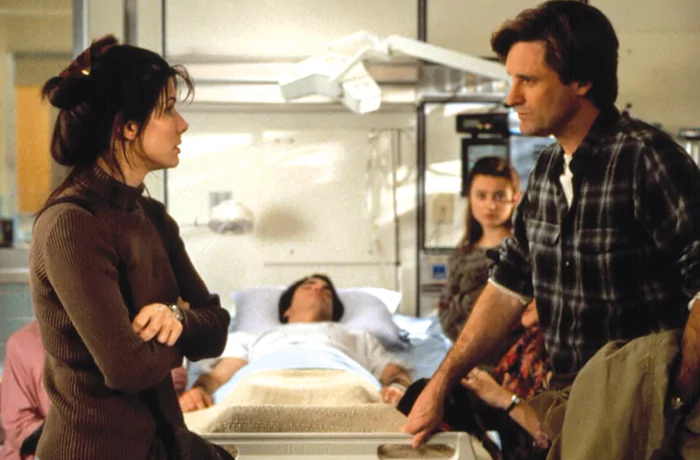Thirty years ago this month, I sat in a suburban movie house and watched America’s sweetheart stumble backward into love. No, the picture wasn’t Pretty Woman, Sleepless in Seattle, or You’ve Got Mail, though those 1990s classics deserve columns of their own. Rather, it was a film that nearly fell apart before it could be made — an arch-reactionary romance whose politics, incredibly, feel newly relevant today.
Few critical platitudes are mustier than the complaint, “They don’t make ’em like that anymore.” But in this case, they really don’t. Indeed, While You Were Sleeping might seem a strange candidate for the full “retrospective” treatment. Though well-received upon its April 1995 release, the film secured no Oscar nominations and locked up only one Golden Globe nod for star Sandra Bullock. Despite massive commercial success, the picture is now mostly neglected, gathering dust on Disney+ even as fellow ’95ers Toy Story and Apollo 13 remain iconic. Amusingly, the movie almost self-destructed at the “table read” stage, surviving only because co-star Bill Pullman had quit his previous film (For Better or Worse) and couldn’t abandon another. Yet, however modest it appears, While You Were Sleeping deserves to be watched anew, if only so that contemporary audiences can be startled by its warmth, traditionalism, and utter unlikeness to anything coming out of Hollywood in 2025.
The movie stars Bullock as Lucy Moderatz, a Chicago transit employee who yearns for marriage and a family. Too shy to attract attention, Lucy has long projected her romantic hopes onto Peter Callaghan (Peter Gallagher), an “El” train regular she’s never spoken to. One Christmas, when muggers push Peter onto the track, Lucy rescues him and is swept along to the hospital in his wake. Upon his family’s arrival, our heroine allows a nurse’s misunderstanding to go unchallenged: Lucy is the comatose Peter’s fiancée, the two of them are madly in love, and an already courageous tale is an epic narrative of selflessness and derring-do.

That story alone might have made for an effective if silly meet-cute. However, as fans of the movie know, screenwriters Daniel Sullivan and Fredric Lebow had a swerve in mind designed to upend Lucy’s romantic expectations. Among Peter’s family members is a younger brother, Jack (Pullman), who slowly beguiles our heroine with his blue-collar charm. The chemistry between the pair is so pronounced that I found myself wishing, as a 14-year-old moviegoer, that the two of them could get together. Never mind poor, comatose Peter at Northwestern Memorial.
Reader, that is (of course) the plot of the movie. Presumably, the adults in the audience saw it coming, as did — let’s face it — most children, non-English speakers, and pets in attendance. An expert in cinematic narrative-making, I was not. Yet, against all odds, the very film whose twist surprised almost no one is now worthy of exactly the higher-level analysis that would have exploded my teenage brain. Not for the first time (think Rocky or Friday the 13th), a harmless popcorn flick turns out to hold the key to an entire American era.
In part, this is due to how radically society has changed in the last three decades. A time capsule from the land before microaggressions, While You Were Sleeping contains such antiquities as a wisdom-dispensing white man (Jack Warden, playing Peter’s godfather) and a sex pest who deserves compassion rather than cancellation (Michael Rispoli, Lucy’s neighbor). It takes for granted that Lucy is better off with a man than without one and with an extended family than on her own. Perhaps most significantly, the movie frames its protagonist as a young woman to whom life has not always been kind but who is nevertheless a morally responsible agent. In other words, the film advances the most obvious values of its own day and the most controversial of ours. One struggles to imagine the Teen Vogue crowd watching it, but my goodness, would they despise this film.
Admittedly, there is at least one practical reason why pictures such as While You Were Sleeping don’t get made anymore. Lacking, at present, a Bullock type, Hollywood can’t simply summon into being an attainably beautiful ingénue who can act. However, it is also true that Bullock’s likeliest heirs have not exactly lined up to make family-friendly, PG-rated rom-coms. Take, for example, Carey Mulligan. Presented with a different incentive structure, the hugely talented star of An Education (2009) might have become a beloved romantic lead in the Julia Roberts or Meg Ryan tradition. Instead, the actress wasted her prime on unwatchable art fare (Shame), feminist revenge fantasies (Promising Young Woman), and period yawners (Suffragette). That no one saw those films is very nearly the point. Better to languish in progressivism’s bosom than to feast in the lap of Middle America.
Nor are top-tier directors immune to the political-status game. When, 25 years ago, I heard the conservative critic Michael Medved bemoan Hollywood’s adoration of Quentin Tarantino, I rolled my eyes. Now I would nod along. Tarantino’s deranged fare had, at the time, grossed about $300 million, compared to the $1.7 billion hauled in by Chris Columbus (Home Alone, Mrs. Doubtfire). Yet which, Medved asked, did we suppose would get the better table at Spago-Beverly Hills?
Perhaps all of this will change in our lifetimes, or is changing already. Still a bottom-line industry despite everything, Hollywood can ill afford more disasters in the Snow Brown and the Seven “Beings” vein. Neither will studios have failed to notice that dispositionally conservative family films don’t even need to be good to make a killing. Though charming in its way, The Super Mario Bros. Movie ($1.3 billion in earnings) did not compete seriously for the Palme d’Or. If a hurdle remains, it is an ideological concession on the part of actors and filmmakers that the old values deserve to be spoken for — that my family’s money still spends. Is such a turnabout likely in President Donald Trump’s America Stranger things have happened.
Graham Hillard is an editor at the James G. Martin Center for Academic Renewal and a Washington Examiner magazine contributing writer.























